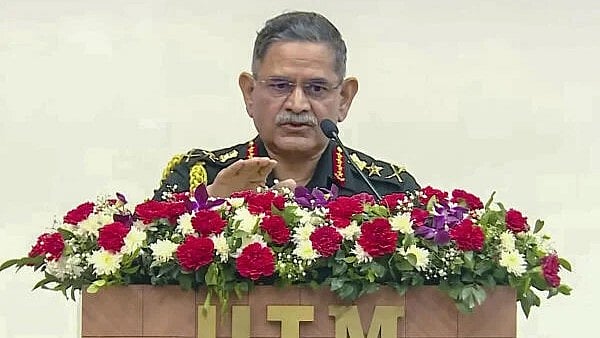
Chief of Army Staff (COAS) General Upendra Dwivedi.
Credit: PTI
New Delhi: Operation Sindoor was a "trusted orchestra" where every musician played a "simultaneous or synergistic role", and that is how in 22 minutes, the Indian armed forces could destroy nine terror sites, Army Chief Gen Upendra Dwivedi said on Saturday.
In his address at a convocation ceremony of a Delhi-based management institute, he also said the military operation reflected a "foresight" to anticipate change as the situation unfolded.
It was "a response shaped not in the moment, but through years of imagining how intelligence, precision and technology could converge into action," the general officer said.
India launched the military operation early on May 7 and decimated multiple terror infrastructure in Pakistan and Pakistan-occupied Kashmir (PoK).
Pakistan also launched offensives against India, and all subsequent counter-offensives by India were also carried out under Operation Sindoor.
The military conflict between the two nuclear-armed neighbours, lasting nearly 88 hours, halted after they reached an understanding on the evening of May 10.
"Op Sindoor was a trusted orchestra where every musician played a simultaneous or a synergistic role. That is how in 22 minutes, we could destroy nine terrorist targets and, we could in 80 hours make sure that the battle comes to an end. But what is more important, there was no time for decision making, had we not visualised, and had we not trusted the entire team," the Army chief said.
On November 17, at an interactive session here, he had said, "On Operation Sindoor 1.0, I would say that the movie had not even begun, only a trailer was shown, and after 88 hours the trailer was over."
In his address at the ceremony hosted by New Delhi Institute of Management (NDIM) here, Gen Dwivedi told the gathering of graduating students to lead with "wisdom, humility and power".
"So as you step forward today, remember the world will never stand still, markets will shift, technology will evolve, and your own ambitions will also change. Yet within that motion lies your greatest strength, the courage to learn, the agility to adapt, and the vision to lead with a purpose. Change is not what happens to us, it's what we choose to become through it," he said.
The general's address was themed on 'Navigating Change: The Real Constant' and he touched upon the aspects of evolving global dynamics, technology as a disruptive force and reflections for the road ahead.
"As the 21st century unfolded, long peace yielded to a contested landscape of competition, contestation and conflicts. As across the world today over 55 conflicts today rage on, drawing in more than 100 nations, directly or indirectly, therefore blurring the boundary between peace and conflict," he said.
And, as battlefields blurred, so did the markets, the Army chief said.
"The rise of nationalism, protectionism and sanctions led to the emergence of geoeconomics, a framework articulated by Edward Luttwak, who described it as a logic of war expressed through the grammar of commerce," he emphasised.
The Army chief said that today, the six chapters of grammar book are different from the traditional Wren and Martin's English grammar book. It contains "cooperation, collaboration, co-existence, competition, contestation and the conflict itself".
"So, these are the 6Cs, which we have to know together. Because, in our strategic dealings also, we deal with the 6Cs, and you also in the future will be dealing with these," he added.
The Army chief underlined the importance of technology in military evolution.
"Technology has transformed warfare, ranging from muddy trenches to intelligent network, rifles to drones, boots to bots, and also revolutions businesses, shampoo sachets to Gemini," he added.
He also emphasised the need for adaptation and what he described in the context of change as "a velocity of relevance".
"Recognising opportunity is one thing, responding to it is another. And that response begins with the courage to embrace change before it compels you to change. When I was commissioned into the Army, computers were nowhere in the horizon in our Army. And here I stand today, leading an Army that applies data sciences and AI in modern war fighting," Gen Dwivedi said.
He said the transformation journey in the Army includes restructuring the force for greater agility, deepening jointness with the Navy, Air Force and other domains, accelerating modernisation through cutting-edge technologies, reforming human resource system and continuously refining our system processes and functions to enhance efficiency and responsiveness.
General Dwivedi said that today he is leading "a community of approximately 1.3 crore soldiers, veterans and families" and that happens to be one per cent of the Indian population.
"As I often tell my friends in the corporate world, that while they handle a few hundred resumes, we handle a few million lives, who are ready to walk into a hail of bullets on your one clarion call."
He also spoke of seeking an opportunity in times of turbulence.
"Let me begin with one that has served the Indian Army well, the ability to find opportunity in uncertainty. In 1971, when turmoil in us, while East Pakistan turned a tide of refugees, creating regional instability, India turned crisis into liberation, reshaping the subcontinent's destiny," the officer said.
On leadership, he said, "Whether on the battlefield or in the board rooms, speed and success come not from control but from trust."